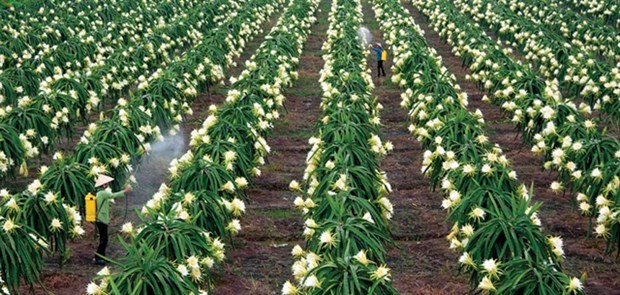Vietnamese dragon fruit needs to find new export markets: Experts
In the first 11 months of this year dragon fruit exports fell by 10 percent because of the COVID-19 pandemic but still dominated Vietnamese fruit exports with shipments of more than 1 billion USD.
 |
| Vietnamese dragon fruit needs to increase its value to enter new export markets and reduce the dependency on the Chinese market. (Photo: VNA) |
But the story Vietnamese consumers know about dragon fruit is not its billion-dollar export but the need for rescue almost every year by authorities as they land in the market at dirt cheap prices. In Ho Chi Minh City, it would then sell for 7,500 VND per kilogramme or even 6,600 VND.
This is because of the overwhelming dependence on the Chinese market. While it is now also exported to new markets such as the US, the EU, Japan, Australia, and South Korea, China still accounts for 92.3 percent of exports.
Thus, whenever there is any problem in the Chinese market such as COVID-19 pandemic, the repercussions will immediately be felt in Vietnam. Moreover, it is not a favourite fruit in Vietnam.
But Chinese especially like the fruit thanks to its beautiful red colour, which makes it suitable for worshipping.
In the past the supply of dragon fruit was limited, and it used to cost 50,000 - 60,000 VND (2.2-2.6 USD) per kilogramme, fetching great benefit to growers.
Compared to rice, it was very profitable, and farmers massively increased the area under the fruit and output, and the inevitable consequence has been lower prices.
According to the Ministry of Agriculture and Rural Development, the area under the fruit now is about 57,000 hectares and output is more than 500,000 tonnes, both 20 times up from 10 years ago.
To increase the value of the fruit, achieving excellence at every step in the value chain is critical to the long-term commercial success of premium fruits, experts said.
This year five tonnes of red-flesh dragon fruit were taken to Australia for a promotional event.
Australia permitted import of Vietnamese dragon fruit in July last year after more than nine years of negotiations.
It is the first and still only country to sell this fruit to Australia.
The promotion of the fruit was meant to grasp an opportunity to create a sustainable position in one of the most demanding markets in the world.
What the stars mean:
★ Poor ★ ★ Promising ★★★ Good ★★★★ Very good ★★★★★ Exceptional
Related Contents
Latest News
More News
- Citi economists project robust Vietnam economic growth in 2026 (February 14, 2026 | 18:00)
- Sustaining high growth must be balanced in stable manner (February 14, 2026 | 09:00)
- From 5G to 6G: how AI is shaping Vietnam’s path to digital leadership (February 13, 2026 | 10:59)
- Cooperation must align with Vietnam’s long-term ambitions (February 13, 2026 | 09:00)
- Need-to-know aspects ahead of AI law (February 13, 2026 | 08:00)
- Legalities to early operations for Vietnam’s IFC (February 11, 2026 | 12:17)
- Foreign-language trademarks gain traction in Vietnam (February 06, 2026 | 09:26)
- Offshore structuring and the Singapore holding route (February 02, 2026 | 10:39)
- Vietnam enters new development era: Russian scholar (January 25, 2026 | 10:08)
- 14th National Party Congress marks new era, expands Vietnam’s global role: Australian scholar (January 25, 2026 | 09:54)

 Tag:
Tag:














 Mobile Version
Mobile Version